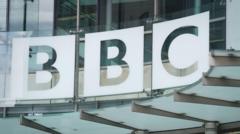The BBC has recently faced scrutiny from the White House regarding its reporting on the Gaza conflict, leading the British broadcasting organization to issue a robust defense of its journalistic practices. During a briefing, President Trump's press secretary, Karoline Leavitt, alleged that the BBC had taken "the word of Hamas" in reporting casualties from a shooting incident near an aid distribution site in Rafah. Furthermore, she incorrectly stated that the BBC had retracted an article about the events, a claim the broadcaster swiftly refuted.
"The claim the BBC took down a story after reviewing footage is completely wrong. We did not remove any story and we stand by our journalism," the BBC stated in a detailed response. The organization clarified that its reports regarding the casualty figures had been updated as new information emerged throughout the day, a standard practice in fast-developing news scenarios. The reported casualties varied from an initial figure of 15 to as high as 31, as stated by different sources, including Hamas-run health officials, and later confirmed by the Red Cross, which reported at least 21 casualties at its field hospital.
Conflicting narratives about the reported violence near the aid distribution center present challenges for accurate reporting. Local witnesses and humanitarian organizations alleged that civilians were shot while awaiting food aid. Meanwhile, the Israeli military disputed these claims, describing them as false, and stated that its forces only fired upon "suspects." The Gaza Humanitarian Foundation characterized the reports as "outright fabrications."
With international news organizations, including the BBC, currently barred from accessing Gaza, the verification of events in the region has become increasingly complex. The situation came to a head on Tuesday when local sources highlighted alleged Israeli military actions resulting in civilian deaths, countered by the Israeli Defense Forces’ assertions of targeting suspects.
The White House also claimed that the BBC's coverage was undermined by its inability to find evidence relating to a viral video—an assertion linked to a BBC Verify report on the footage that was not connected to the aid distribution site in question. The BBC clarified that this viral content did not form part of their news coverage and found the conflation of these stories to be misleading.
As the media landscape evolves in the midst of this conflict, the BBC underscored the urgency of accurate reporting, advocating for greater access for international journalists to ensure that the realities on the ground are duly represented. In the wake of the military actions that began in October, significant loss of life has been reported, with over 54,000 estimated casualties in Gaza according to local health authorities.



















